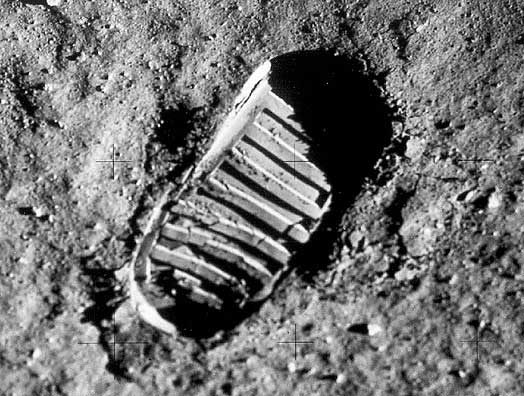
Footprints and Dissertations
On July 21, 1969 at 02:56:15 UTC, Neil Armstrong made perhaps the most famous footprint in all of history. Describing it as “one small step for man, one giant leap for mankind,” Armstrong identified an important duality dissertation students…
Yesterday, I discussed the lunar landing and what you can learn about setting and achieving dissertation goals. Today, let’s reflect on what Neil Armstrong’s famous quote means for doctoral students.
“That’s one small step for man, one giant leap for mankind.”
There are two parts to this quote: i) one small step for man, and ii) one giant leap for mankind.
Too many dissertation students view there dissertations as the latter.
The dissertation represents the highest form of scholarship. Students often romanticize this notion to the point that completing the dissertation becomes an impossible task…even more than a giant leap for mankind.
The dissertation does not require you to:
- Find a cure for cancer,
- End hunger, or
- Bring about World Peace.
Sure, it sounds silly to put it this way, but a great many dissertation students effectively undertake this same level of stress and frustration.
“Choose a topic you’re passionate about.”
Have you ever heard this advice before?
Unfortunately, this seemly well-meaning advice is, in fact, an insidious trap. You see, there are two ways to approach a dissertation: as a hobby and as a job.
A hobby is an enjoyable way to spend time. One extracts utility merely by engaging in the activity. People often refer to “wasting time” on their hobbies. But, such a description is really a tongue-in-cheek, self-effacing characterization.
A hobby isn’t really a waste of time at all. It is a way to relax and recharge, to clear one’s mind and prepare for the work ahead. A hobby is the way you choose to spend time until you have to get back to “more productive” pursuits.
Do you consider your dissertation to be a hobby? Do you want to “waste time” on your dissertation? Do you want your dissertation to consume every available moment of your time? Well, if you choose a passion project for your dissertation, that’s exactly what you’re doing!
When you pick a project you’re passionate about, you want to do it “right.” Of course, you need to do a good job on your dissertation, but when you pursue a passion project, you want it to be done just so. It’s hard to accept criticism. It’s difficult to incorporate feedback. It’s tough to narrow the scope of your work, because all of it is genuinely important to you.
On the other hand, a job is something you get done as quickly as possible. Get in, get out, and move on to something else. You still want to do well at your job, but the focus is on finding an acceptable level of completion. The minutia does not carry the same level of importance at your job as it does for your passions.
So, which do you want your dissertation to be: one small step for man, or a giant leap for mankind?
This is an honest question that you have to answer for yourself. Each of us takes a different path in life. Each of us yield to different motivations. Neither choice is right, and neither choice is wrong. But, one choice is clearly right for you!
If you choose to treat your dissertation as a small step, a job, then you are positioning yourself to finish quickly so that you can move on to other things. If you choose to treat your dissertation as a giant leap, a passion, a legacy, then your are positioning yourself for an epic journey, a tale to write home about. The former leads to graduation as quickly as possible. The latter may or may not end in graduation at a much later date.
Either choice is OK. Just be clear that you are actually making a choice. Don’t simply default to the wrong path because you failed to explicitly consider your options.
At Dissertation Done, I work with students who choose the former path. They want to get done as soon as possible. As efficiently as possible. As reliably as possible.
